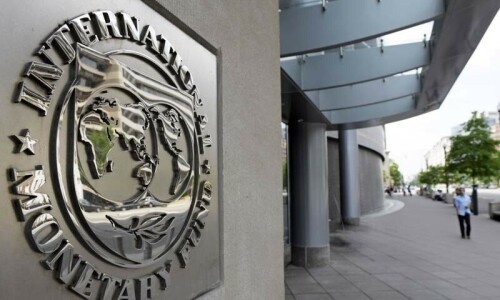WASHINGTON, Aug 29: There’s recognition in Pakistan that the current political process was ‘pretty challenging’, said Chairman of the US Joint Chiefs of Staff Admiral Mike Mullen while talking about a secret meeting between US and Pakistani generals aboard an American aircraft carrier earlier this week.
The admiral shared his observation with the media when asked at a Pentagon news conference on Thursday if political instability in Pakistan was hampering Army Chief Gen Ashfaq Parvez Kayani.
“Without going into specific details of the discussion, clearly there’s recognition in Pakistan that the political process is pretty challenging,” said Admiral Mullen.
“Actually when I first met him (Gen Kayani), it was a couple of weeks before the first election, and now there’s another election, having had a president resign. So, obviously there is a significant amount of political churn in Pakistan that he’s very much aware of.”
Admiral Mullen then explained how he knew Gen Kayani and how he learned to trust him as a soldier.
“I will tell you — I mean, this is as I have come to know him — he’s been very clear to me, and not just in saying it, but in what his actions are, that his goal — my view — is to do the right thing by Pakistan,” the admiral said.
“He’s an extraordinary individual and his ultimate — his goals are — his principles and goals are to do what’s best for Pakistan. And everything he’s done, our engagement, indicates that’s absolutely the case.”
When a reporter asked Admiral Mullen whether Gen Kayani’s goal for Pakistan also aligned a hundred per cent with the US goal, he said: “He knows his country a whole lot better than we do. And again, I just think that’s where he is, that’s where he’ll stay.”
The US military official then reminded the reporter that Pakistan was an important ally in “a very, very critical and increasingly unstable part of the world and having that relationship is really what it’s all about it.”
Admiral Mullen’s responses encouraged another reporter to ask whether the US would prefer to deal with the military or the political government.
The admiral’s carefully worded answer keeps both the options open.
“The military-to-military engagement with Pakistan is like any other country. And since that’s the relationship that we are continuing to work on, evolve.”
But he also acknowledged that “the right way” to engage Pakistan is through their newly elected leadership and there were other people in the US government who would be the right ones to deal with Pakistan on the political side.
Asked if the removal of President Musharraf would hurt US interests in Pakistan, Admiral Mullen said: “I think we need to move ahead. President Musharraf’s made a decision. He’s moved on. I think we all need to move on and look to a future that … we both understand.”
Admiral Mullen said that Gen Kayani and he agreed to hold a meeting of top US and Pakistani commanders some weeks ago but “we didn’t know exactly when it would occur, nor did we know where it was going to occur”.
The top US commander disagreed with a suggestion that the meeting had been called to deliver an ultimatum to Pakistan to root out terrorism or face the consequences.
“No, there was no ultimatum. I mean, that is not — in my view, that doesn’t work in this kind of relationship building. And more than anything else, I think it was that. We clearly went through what the challenges are, the specifics of it, what we think the threat is, how to get at it.”
Admiral Mullen said he saw the meeting as an opportunity to “understand the problem as seen through the senior military officer’s eyes who’s got to fight this campaign in his own country, recognising that Pakistan has a serious extremist threat, and to see it through his eyes”.
The admiral said that although the meeting reviewed the situation along the Afghan border, Afghanistan was not invited because it was a bilateral meeting between senior US and Pakistani commanders.
He recalled that earlier this month, Gen Kayani had gone to Kabul to participate in a tripartite meeting of US, Pakistani and Afghan officials and met his Afghan counterpart Gen Bismillah Khan.
A senior US official familiar with the discussion on USS Abraham Lincoln said it was “more collaborative”, compared to a similar meeting a month ago when Admiral Mullen took a “more firm tone” in warning Gen Kayani that Islamabad was not doing enough to counter militants waging cross-border attacks in Afghanistan.










































Dear visitor, the comments section is undergoing an overhaul and will return soon.